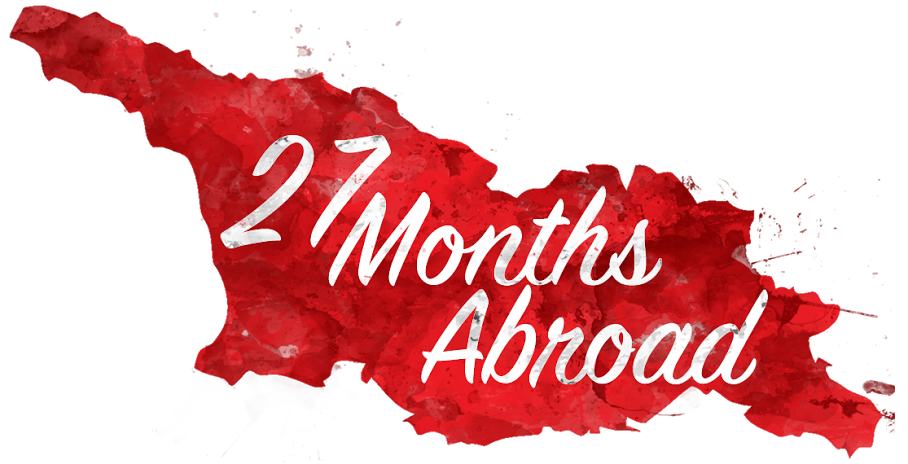For this Thanksgiving edition, I’ve asked my friend and fellow PCV Phil to write a guest blog post. Enjoy his post and my pictures to accompany his writing 🙂 – Rawan
Let me tell you about PC Georgia G16 Extension to the Next Dimension Friendsgiving 2018 Rach’ Out with your Crotch Out, our snowy northbound excursion! Do you want to hear about our marshutka struggling up a craggy mountainside? Battening down the hatches against the frosty weather with a village host as we share the latest news, cooking local fowl and transplanting our American holiday customs into the far-flung and hoary Caucuses?
Couldn’t find a place to do it.

Winter excursion season usually starts December 8th when the skiing opens, but we can’t help it. Our schedule is what it is. We tried booking three different places through Airbnb in Oni, Nikortsminda, and, forgoing Racha altogether, Bakuriani to the south. In all three instances we learned a day after booking that the host either wasn’t checking their email, had booked another guest without taking down their posting, or hadn’t gotten their pad functional yet, sincerest-apologies-come back-next-week.
Booking.com found us an apartment in the center of Bakuriani, and then the evening before we were due there our man called to say that there was no water at his digs. “That gonna be a problem?”
Like Jonah in the belly of the whale, we can take a hint. So, we stayed put in Rawan and Justin’s home and cooked a Thanksgiving spread so lavish it shames us. Orange chicken; mashed potatoes; pumpkin gnocchi; butternut squash soup; stuffing; glazed carrots; gravy; and brownies.

Thanksgiving is a good time to put aside this jocular self-pity and acknowledge that we as Americans and Peace Corps Volunteers have oodles to be thankful for. I’m sure if our stateside countrymen knew what a blast the Peace Corps is, they’d run – not walk – to sign up, leaving their front doors open and the kettle still on.
Every day we get to partner with those Georgians who are doing the essential work of developing their country and its institutions. All the while we upload into our consciousness several lifetimes’ worth of lessons, inspiration and formative experience that we shall not fully grasp and appreciate until years down the road.
Georgia is a fascinating country with rare natural beauty and extremely likable people. We are fortunate to work and live in such a place, and that we have this time to explore it together.
For explore we did, albeit in shorter range than intended. After sleeping off the chow, Saturday we ventured a short way uphill to see the historical double-act of Motsameta and Gelati Monasteries.

Motsameta sits atop a cliff jutting out over a gorge, dropping on three sides, with a fine view of the Tskaltsitela River below. The church contains a shrine to the bones of two 8th century Georgian martyrs, the brothers Davit and Konstantin Mkheidze, local dukes who were tortured and executed by Muslim invaders for refusing to convert. There were several weddings in progress when we visited, and while we waited to enter the chapel where the ceremonies were underway and the holy relics housed, we played with the monks’ well, into which visitors had thrown coins despite an injunction not to do so.

Gelati was less crowded and under construction. It was founded in 1106 by David IV, known by the epithet Aghmashenebeli – “The Builder”. He is a heroic figure in Georgian medieval history, under whose reign Georgia came to dominate the Caucasus. He is buried at this site under a gate stripped as a prize from the city of Ganja in Azerbaijan by David’s son Demetrius.

We capped off the evening at the old PCV-standby Praha, to show our eastern companion some damn fine bean-bread. It is a testament to the excellence and quality-depth of our post that even when Plans A-through-D disintegrate, E, F, G, and H satisfy. Count your blessings and Happy Thanksgiving!




